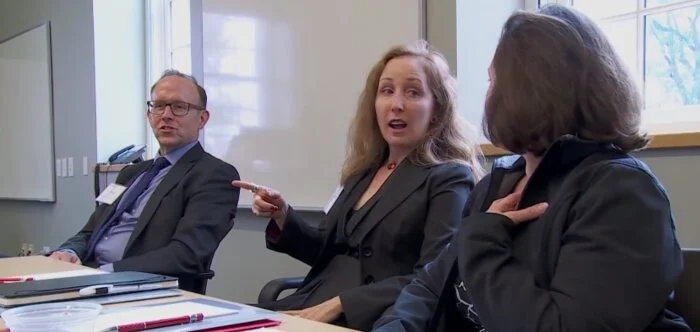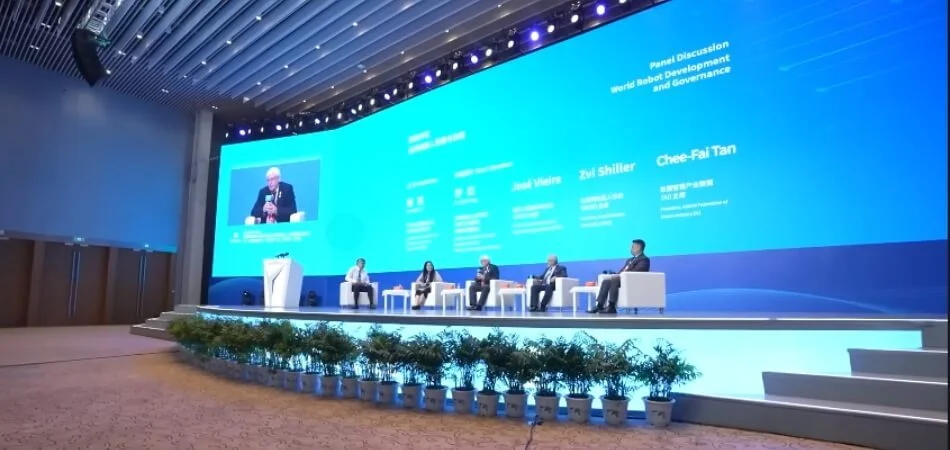Successful conferences are driven by themes that are more than catchy phrases or trending topics. By asking, “What are conference themes?” we explore what gives a conference its identity and purpose.
Conference themes are not just discussion topics; they shape the entire event, influencing its agenda, tone, and marketing. They act as a guiding star, ensuring that every aspect of the conference aligns with a central idea, providing attendees with an engaging and cohesive experience.
Would you like to learn more about how these themes are chosen and how they can add value to your conference experience? Keep reading as we explore the impactful world of conference themes in greater detail.
Things You Should Know About Conferences
There is no doubt that conferences are vital platforms where professionals from different fields come together to learn, share innovation, and develop collaborations. These conferences provide opportunities for exchanging ideas, networking, and gaining fresh perspectives on various subjects. They often attract participants from across the globe, contributing to the richness of the discourse. To make the most of these opportunities, it’s essential to know the ways to determine a conference that aligns with your professional goals and interests.
Each conference, especially events that are held globally, typically features a series of talks, workshops, and panel discussions, led by experts and thought leaders. These sessions provide attendees with valuable knowledge and the opportunity to engage in meaningful dialogue. Beyond the formal agenda, conferences offer unique chances for informal interactions, promoting connections that can last a lifetime.
What Are Conference Themes?
Conference themes function as the focal point for gatherings, guiding the topics and discussions throughout the event. These themes are carefully selected to align with current trends and pressing issues within a specific industry or field. By centering on a relevant theme, conferences can ensure focused and impactful content. This thematic approach helps attract speakers and attendees who are keenly interested in the subject.
Professionals, academics, and enthusiasts are all expected to be engaged by the theme chosen by the organizers. This ensures that the presentations, workshops, and networking sessions are not only informative but also directly relevant to attendees’ interests or professional development. A well-chosen theme can significantly contribute to the exchange of ideas and promote collaboration among participants. It acts as a compass, guiding the event’s structure and the selection of keynote speakers.
Having a central theme also helps market the conference to potential attendees. It makes it easier for people to decide whether the conference aligns with their interests or professional goals. Furthermore, a theme can spark interest and anticipation, making the conference a must-attend event in the eyes of its target audience. Overall, the theme of a conference plays a crucial role in defining its success and the value it offers to its participants.
Key Things Included in a Conference Theme
A conference theme is more than just a title—it sets the tone for everything from discussions to networking. A well-thought-out theme brings clarity, guiding speakers and attendees alike. Let’s look at the key elements that shape a strong conference theme.
Relevance to Industry
A theme should connect with the interests and challenges of attendees. It needs to reflect current trends, emerging technologies, or pressing issues in the field. This ensures that discussions stay meaningful. A relevant theme also increases engagement, making the conference more valuable for participants.
Speaker Alignment
A strong theme allows speakers to tailor their presentations effectively. When the theme aligns with their expertise, they can provide deeper insights and practical takeaways. It also helps create a consistent flow between sessions, keeping the audience engaged throughout the event.
Audience Appeal
Every conference is designed for a specific group, so the theme should match their expectations. It should be interesting enough to attract attendees while remaining broad enough to cover multiple perspectives. Many large-scale events aim to bring fresh ideas from different parts of the world, making international conferences a great space for insightful discussions. For example, many conferences in Canada focus on innovation, education, and research, making their themes engaging for professionals and students alike.
Practical Application
A great theme doesn’t just sound good—it leads to action. It should inspire discussions that result in real-world solutions, strategies, or ideas. The best themes leave attendees with valuable insights they can apply in their work or studies.
Memorable Branding
A well-crafted theme contributes to the conference’s branding. It should be simple, clear, and easy to remember. A strong theme helps with marketing, making it easier to communicate the event’s purpose to a wider audience.
A well-structured theme creates a meaningful experience for attendees. It influences everything from the topics covered to the overall conference atmosphere. Choosing the right theme ensures that discussions stay impactful and engaging.
The Benefits of Having an Attractive Theme for the Conference
Having an attractive theme is crucial to the success of a conference. This sets the tone and draws people in, which makes the experience more engaging. The following are some key benefits of having an appealing conference theme.
Improved Engagement
An appealing theme captures the interest of potential attendees, piquing their curiosity. It serves as a magnet, drawing in a diverse audience eager to learn and participate. Such a theme fosters an environment of active participation, enhancing the overall interaction. Attendees are more likely to engage deeply when the theme resonates with their interests.
Stronger Brand Identity
A distinctive theme helps in creating a unique identity for the conference. It distinguishes the event from a sea of similar gatherings, making it memorable. This uniqueness aids in building a strong brand, which can attract repeat attendees in future years. A well-chosen theme becomes synonymous with the conference’s brand, enhancing its recognition.
Increased Sponsorship Opportunities
An attractive theme can be a lure for sponsors and partners. It offers potential sponsors a clear vision of the event’s direction and audience. Sponsors are more inclined to invest in a conference that aligns with their brand values. A good theme can open doors to new funding sources, elevating the conference’s quality.
Better Networking Prospects
A compelling theme acts as a common ground for attendees, fostering networking. It encourages conversations among participants with shared interests. This networking can lead to collaborations and partnerships, extending beyond the conference. A well-thought-out theme can catalyze connections that might not otherwise occur.
Lasting Impact and Legacy
An attractive theme has the power to leave a lasting impression on its attendees. It can inspire change, spark new ideas, or initiate industry trends. The discussions and insights generated can influence practices long after the event concludes. An impactful theme ensures the conference’s legacy continues in its aftermath.
An attractive theme is a crucial element in the success of a conference. It not only raises engagement and brand identity but also opens up sponsorship and networking opportunities while leaving a lasting impact. A thoughtfully chosen theme transforms a standard conference into an impactful, memorable event that resonates with its audience and sponsors alike.
How to Select the Right Theme for the Conference?
Selecting the right theme for a conference is a critical decision that sets the stage for its success. It involves knowing the event’s objectives, audience, and current industry trends. A well-chosen theme can significantly raise the conference’s appeal and effectiveness. Below is the step-by-step process to select the right theme for the conference:
Step 1: Know Your Audience
Identify your target audience by analyzing them. Consider their interests, challenges, and industry trends that connect with them. A theme that aligns with their aspirations and professional needs will likely attract more attendees.
Step 2: Align with Conference Objectives
Be sure that the theme aligns with the overall objectives of the conference, such as educating, networking, or inspiring innovation. Knowing these common objectives for conferences helps in setting a clear and relevant direction for the event. The theme should reflect these goals to ensure it resonates well with the anticipated outcomes.
Step 3: Consider Current Trends
Stay informed about current trends and hot topics within the industry. A theme that is timely and relevant will spark interest and encourage participation, making the conference more engaging and pertinent.
Step 4: Brainstorm with Stakeholders
Involve key stakeholders in the brainstorming process. Gathering diverse perspectives can lead to the selection of a theme that is inclusive and appealing to a broader audience.
Step 5: Evaluate and Finalize
After brainstorming, review the shortlisted themes for feasibility and impact. Consider factors like potential speakers, content possibilities, and marketing strategies that align with the theme.
Picking the right theme is essential for meeting the common objectives of conferences and ensuring their success. Thoughtfully chosen, it can transform an ordinary conference into a significant industry gathering.
FAQs About What Are Conference Themes?
Conference themes play a significant role in shaping an event’s identity and purpose. They guide discussions, set the tone, and influence every aspect of the conference. Below are some frequently asked questions to help you know conference themes better.
Can a Theme Attract Sponsorship Opportunities?
Yes, an appealing theme can attract sponsors who align with the event’s focus. Sponsors are more likely to invest in conferences that reflect their brand values. A strong theme offers a clear vision of the conference’s direction and audience. This makes it easier to secure funding and partnerships.
How Do Conference Themes Influence Speaker Selection?
Conference themes guide the selection of speakers who align with the event’s focus. Organizers choose experts who can contribute meaningful insights relevant to the theme. This ensures that presentations resonate with the audience and support the overall goals of the conference. A well-chosen theme attracts speakers with valuable expertise.
What Is the Long-Term Value of an Effective Conference Theme?
An effective theme can create lasting benefits for the conference brand and reputation. It contributes to attendee loyalty and repeat participation in future events. A strong theme contributes to the overall impact and influence of the conference. This long-term value can lead to broader recognition in the industry.
Can a Theme Influence the Conference’s Marketing Strategy?
Yes, a clear and attractive theme helps create a focused marketing strategy. It makes it easier to communicate the conference’s purpose and attract the right audience. The theme acts as a central idea that ties all promotional materials together. This strengthens the conference’s branding and appeal.
Why Is Clarity Essential in a Conference Theme?
Clarity ensures that the theme is easily understood by all participants. A clear theme guides the direction of discussions and content. This prevents confusion and keeps the event focused. Clear themes are more effective in achieving the conference’s objectives.
Final Thoughts
Conference themes are not just titles but essential elements that shape the entire essence of a conference. They act as guiding lights, determining the direction, focus, and atmosphere of the event.
“What are conference themes?” is a question that underlines their significance in creating a solid and engaging experience. These themes are instrumental in defining the conference’s content, improving marketing efforts, and bringing up networking opportunities.
Moreover, a well-chosen theme can strengthen the conference’s brand identity, attract sponsorships, and leave a lasting impact on attendees. It’s crucial to select a theme that resonates with the audience and aligns with the conference’s objectives. The right theme makes a conference more than just a gathering; it leaves a lasting impact and memory.








